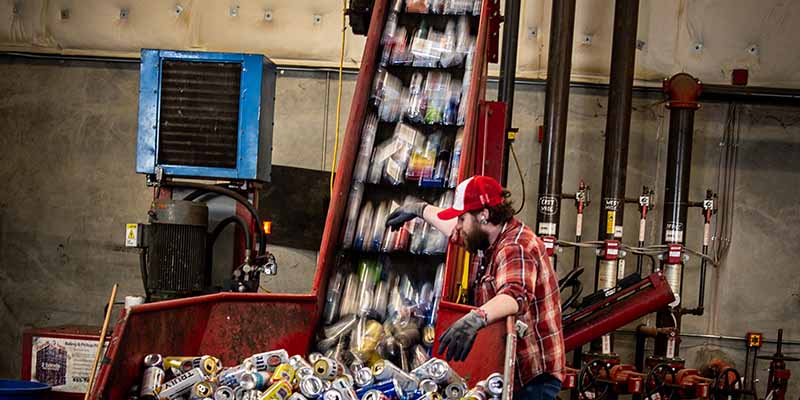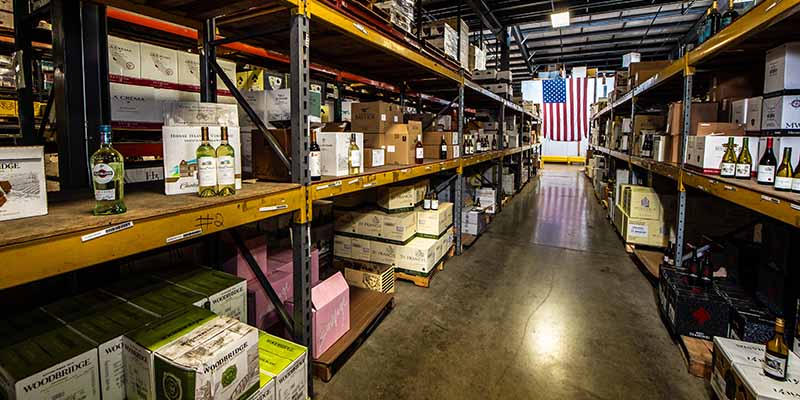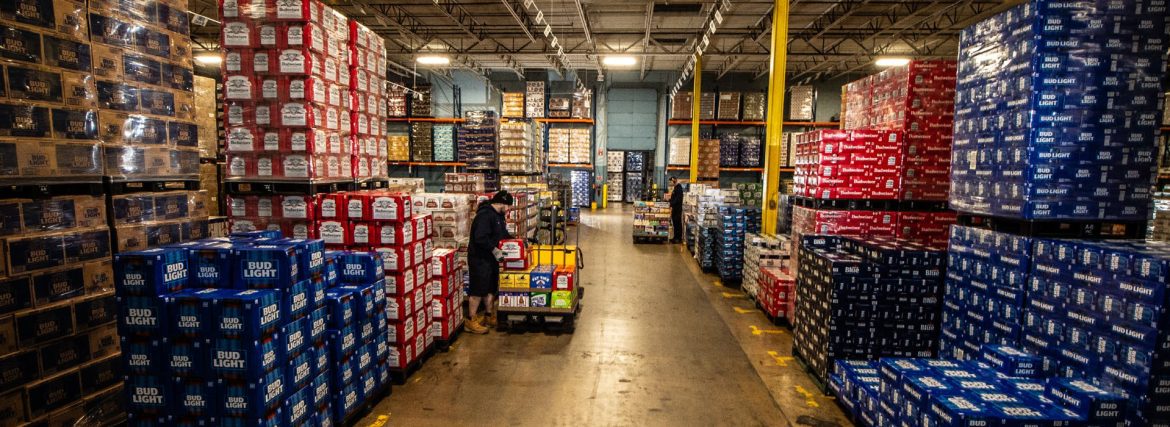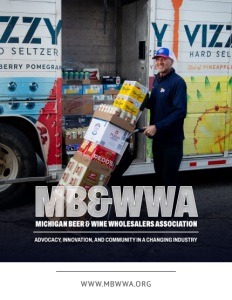Advocacy, Innovation, and Community in a Changing Industry
Representing the needs of an ever-changing and evolving industry
Michigan is known for its Great Lakes, its tourism destinations, and its thriving craft beverage scene. But behind every bottle of beer, glass of wine, or ready-to-drink cocktail on store shelves lies a carefully managed distribution network that ensures quality, safety, and choice for consumers. At the center of this system is the Michigan Beer & Wine Wholesalers Association (MB&WWA), a statewide trade group representing 42 independent beer and wine distributors.
For decades, the association has been a trusted voice in Lansing and beyond, advocating for the industry, providing education and training, and creating opportunities for networking. Its members employ more than 6,400 Michiganders in good-paying jobs with benefits, while ensuring that the state’s three-tier distribution system remains strong and competitive.
“Our mission is simple but vital,” explains the association’s President, Spencer Nevins. “We advocate for our members, we provide education and resources, and we bring the industry together. At the same time, we’re always looking ahead—anticipating change and ensuring Michigan remains a leader in the alcohol beverage industry.”
A Voice for 42 Distributors
The MB&WWA’s members play a crucial role in Michigan’s economy. They are the middle tier in the three-tier system, standing between producers and retailers. This structure—established after Prohibition—creates independence between product makers, distributors, and sellers.
The association is firm in its belief that the three-tier system remains essential today. It ensures that consumers have access to a wide range of products, that smaller producers can compete alongside global giants, and that alcohol sales are regulated in ways that protect public health and safety.
Beyond advocacy, the MB&WWA provides direct value to its members through training, compliance and public relations support, a healthcare program for participating members, and management of a third-party container pick-up and processing program for Michigan’s bottle bill—one of the nation’s most robust recycling programs.

Meeting Challenges Head-On
Like many industries, Michigan’s beer and wine distributors faced unprecedented challenges during the COVID-19 pandemic. Shifts in consumer behavior, sudden shutdowns, and strict rules on product pickup and destruction required nimble responses.
“COVID-19 taught us just how resilient this industry can be,” Nevins reflects.
“Distributors kept supply chains moving, supported retailers, and adapted quickly. We didn’t just survive—we kept people employed and maintained stability for communities.”
Workforce challenges remain top of mind. Recruiting truck drivers, warehouse staff, and other frontline employees has become increasingly competitive. Rising healthcare costs for members—who collectively cover thousands of employees and their families— add another significant challenge.
At the same time, the industry must keep pace with changing consumer preferences. Ready-to-drink (RTD) cocktails, non-alcoholic beverages, and hemp beverage products are carving out shelf space alongside traditional beer and wine. These trends create both opportunities and regulatory questions.
Legislative Advocacy and Policy Leadership
One of the MB&WWA’s greatest strengths lies in its legislative advocacy. The association works closely with policymakers in Lansing to shape regulations that balance industry growth with public health and safety.
Key initiatives on the legislative agenda include:
- Regulating hemp beverages: With growing interest in hemp-infused drinks, the MB&WWA is advocating for a clear regulatory framework that ensures safety while giving distributors a role in managing this emerging category.
- Offsetting distributor costs for the bottle bill: Michigan’s 10-cent deposit system is one of the strongest in the nation, but it needs a long-term funding solution to remain efficient and effective.
- Supporting RTD innovation: By updating marketing and advertising laws, the association aims to ensure that new product categories can be brought to market responsibly.
- Preserving a competitive market: The MB&WWA remains vigilant in defending the three-tier system, ensuring that all brands, large and small, have access to the market.
“Our advocacy is about balance,” Nevins emphasizes. “We want innovation, but we also want public health and safety and a level playing field. Michigan can have both.”

Success Stories and Sustainability
Despite challenges, the MB&WWA and its members have much to celebrate. Employment has remained steady, with distributors offering attractive benefits such as health insurance, 401(k) retirement plans, and flexible schedules. These jobs are often long-term careers in which employees find great fulfillment.
The association also highlights industry innovations. RTDs and non-alcoholic options are growing rapidly, giving consumers more choices and keeping Michigan on the cutting edge of beverage trends.
Sustainability is another area of focus. Members are investing in fuel-efficient delivery vehicles, energy-smart warehouses, and recycling initiatives. The association’s stewardship of the bottle bill reflects a decades-long commitment to environmental responsibility.
“Michigan has a lot to be proud of,” Nevins notes. “We have world-class breweries and wineries, a vibrant tourism industry, and distributors committed to doing business the right way.”
Networking and Education
Community is central to the MB&WWA’s work. Throughout the year, the association hosts events that bring members together for training, advocacy, and camaraderie.
- The summer convention is a flagship gathering, combining education with networking opportunities.
- A winter seminar provides timely updates on regulatory issues and industry trends.
- Lobby Day and Spring Party connect members with legislators, ensuring policymakers hear directly from the industry.
- An annual holiday luncheon offers a chance for members to connect informally and celebrate the year’s accomplishments.
Participation in national conferences further strengthens Michigan’s role in the broader beverage landscape. These events allow members to benchmark against other states and bring back ideas that enhance local operations.
Supply Chain and Economic Resilience
While supply chain challenges made headlines during the pandemic, Michigan’s distributors proved remarkably resilient. Thanks to strong logistics systems and dedicated employees, product shortages were rare, and retailers remained well-stocked.
Tariffs and trade policy continue to impact exporters, but the MB&WWA avoids diving into political debates. Instead, the focus remains on ensuring a stable, competitive, and well-regulated market that prioritizes both public health and economic opportunity.
Looking Ahead
As the beverage landscape evolves, the MB&WWA is preparing its members for the future. Workforce development will remain a top priority, with ongoing efforts to recruit and retain talent in critical roles. Healthcare solutions will continue to be explored, ensuring that member companies can provide competitive benefits without unsustainable cost burdens.
On the legislative front, the push to regulate hemp beverages and update advertising laws for RTDs represents the next chapter in Michigan’s regulatory journey. Meanwhile, the association will continue advocating for reforms that help offset distributor costs tied to their significant investment in operating and maintaining Michigan’s bottle bill system—making it stronger, more efficient, and more consumer-friendly.
Above all, the MB&WWA remains committed to its members’ success and the health of Michigan’s communities. By creating jobs, supporting sustainability, and keeping the marketplace competitive, beer and wine distributors help ensure that Michigan consumers continue to enjoy a diverse and dynamic selection of beverages.
A Tradition of Leadership
From its founding in 1948 through today, the Michigan Beer & Wine Wholesalers Association has been a steady hand guiding the state’s beverage industry through change. Its focus on advocacy, education, and networking provides stability while encouraging innovation.
“Michigan’s beverage industry is strong because it’s built on collaboration,” Nevins concludes. “Distributors, retailers, and producers all have a role to play. Our job is to make sure the system works—for our members, for consumers, and for the state of Michigan.”
With a vibrant beer and wine scene, a resilient workforce, and a tradition of forward-thinking advocacy, the MB&WWA is poised to keep Michigan at the forefront of the national beverage industry for years to come.
AT A GLANCE:
Who: Michigan Beer & Wine Wholesalers Association (MB&WWA)
What: The Voice of industry helping members through advocacy and education
Where: Lansing, Michigan
Website: www.mbwwa.org


